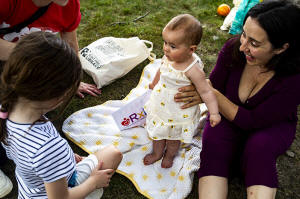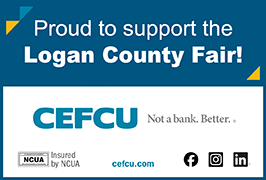How a Michigan program that gives new mothers cash could be a model for
rest of US
[August 01, 2025]
By ISABELLA VOLMERT
FLINT, Mich. (AP) — A procession of mothers wearing red sashes, pushing
strollers and tending to toddlers made their way Friday to a little
festival in Flint, Michigan, where families received diapers and kids
played.
It was called a “baby parade.”
The sashes indicated the women were participants of a growing program in
Michigan that helps pregnant women and new moms by giving them cash over
the first year of their children's lives. Launched in 2024, the program
comes at a time when many voters worry over high child care costs and
President Donald Trump’s administration floats policy to reverse the
declining birth rate.
Backed by a mix of state, local and philanthropic money, Rx Kids gives
mothers of newborns up to $7,500, with no income requirements and no
rules for how the money is spent. Supporters believe the program could
be a model for mitigating the high cost of having children in the U.S.
“There’s all kinds of reasons, no matter what your political affiliation
or ideology is, to support this,” said state Sen. John Damoose, a
Republican and ardent supporter of the program.
How the program works
To qualify, women need to prove they live in a participating location
and that they are pregnant, but don’t have to share details about their
income.
It's designed to be simple.
Pregnant women receive $1,500 before delivery and $500 every month for
the first six to 12 months of their babies’ lives, depending on the
program location.
Dr. Mona Hanna, a pediatrician, associate dean for public health at
Michigan State University College of Human Medicine and the program's
founding director, said that window is a time of great economic
vulnerability for new parents — and a critical developmental period for
babies.

Most participants need diapers, formula, breast feeding supplies and
baby clothes but every family's needs are different. The monthly payment
can also help buy food and cover rent, utilities and transportation.
For some moms, the extra cash allows them to afford child care and
return to work. For others, it allows them to stay home longer.
The program so far is available in Flint, Pontiac, Kalamazoo and five
counties in the Upper Peninsula of Michigan. By fall, it will expand to
a rural central Michigan county and several cities near Detroit.
Hanna said the main piece of feedback she hears is that the program
should be bigger. She’s heard from lawmakers and others hoping to start
similar programs in other states.
What's the impact
Hanna said the program's data shows nearly all pregnant women in Flint
have signed up since it became available.
The locations were designed to target low-income families, though there
is no income requirement. Luke Shaefer, a professor of public policy at
the University of Michigan and a co-founder of Rx Kids, said they wanted
to eliminate any stigma or barriers that discourage people from signing
up.
The founders also want mothers to feel celebrated, hence the parade
Friday.
“For so long moms have been vilified and not supported,” Hanna said.
Friends told Angela Sintery, 44, about Rx Kids when she found out she
was pregnant with her second child. She's a preschool teacher who spread
the word to other parents.
Sintery had her first daughter 19 years before her second and had to buy
all new baby supplies.
She said the cash provided by Rx Kids would have been helpful when she
had her first child at age 24, before she went to college.
“So this time around, I didn’t have to stress about anything. I just had
to worry about my baby,” she said.

[to top of second column]
|

Caroline Doennez smiles as she holds up her nine-month-old daughter,
Violet, during the Flint Rx Kids Baby Parade event on July 25, 2025
in on Applewood Campus in Flint, Michigan. The event celebrates the
continued impact of Rx Kids on Flint families and babies. (AP
Photo/Emily Elconin)
 Celeste Lord-Timlin, a Flint
resident and program participant, attended the baby parade with her
husband and 13-month-old daughter by her side. She said the deposits
helped her pay for graduate school while she was pregnant.
“It allowed us to really enjoy being new parents," she said.
Changing the conversation
The program relies heavily on philanthropic donations but Hanna’s
long-term goal is for the government to be the main provider.
“I see philanthropy as the doula of this program, they are helping
birth it,” she said. “They are helping us prove that this is
possible.”
Democrats in Michigan's state Senate introduced legislation in
February that would make the program available to any pregnant woman
in the state and it has bipartisan support. But with a divided
Legislature only able to pass six bills total this year, it's
unlikely the program will yet expand statewide soon.
Even Damoose, among the program's top backers, said he doesn't think
Michigan can afford statewide expansion yet. But the lawmaker who
represents parts of the Upper Peninsula of Michigan does want to
keep growing it.
For fellow Republicans who oppose abortion as he does, the approach
is a “no brainer” way to help pregnant women, Damoose said.
“We’ve been accused for years and years, and not without cause, of
being pro-birth, but not pro-life,” he said. “And this is a way for
us to put our money where our mouth is.”
The cost of kids
A new movement of pro-natalist political figures, including Vice
President JD Vance, Elon Musk and other members of Trump's
periphery, have harped on the country's declining birth rate.
But a recent Associated Press-NORC poll found that most Americans
want the government to focus on the high costs of child care — not
just the number of babies being born here.
Under Trump’s tax and spending bill that Congress passed in July,
the child tax credit is boosted from $2,000 child tax credit to
$2,200. But millions of families at lower income levels will not get
the full credit.
The bill will also create a new children’s saving program, called
Trump Accounts, with a potential $1,000 deposit from the Treasury.

That’s not available until children grow up and is more focused on
building wealth rather than immediate relief, Hanna said.
“We don’t have that social infrastructure to invest in our
families,” Hanna said. “No wonder people aren’t having children and
our birth rates are going down.”
The Trump administration has also toyed with the idea of giving
families one-time $5,000 “baby bonuses,” a policy similar to Rx
Kids.
Critics have rightly pointed out that doesn't come close to covering
the cost of child care or other expenses. Defenders of a
cash-in-hand approach, though, say any amount can help in those
critical early months.
“I think it’s part of a new narrative or the rekindling of an old
narrative where we start to celebrate children and families,” said
Damoose.
___
Associated Press writer Mike Householder contributed to this report.
All contents © copyright 2025 Associated Press. All rights reserved |